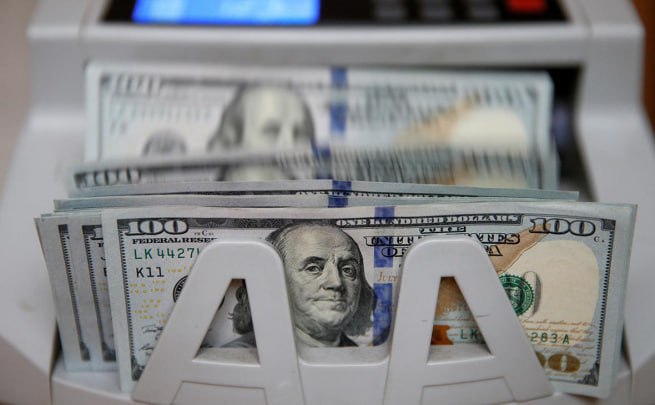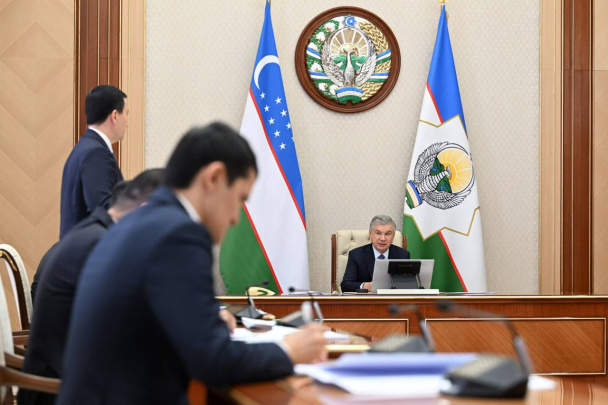Uzbekistan’s public debt decreased in relation to GDP
As of October 1 of this year, the state debt of Uzbekistan was $26.2 billion. During the first 3rd quarter, due to global inflation, the increase in interest rates in the world limited the active borrowing of the government of Uzbekistan, as in previous years. Nevertheless, in the last quarter, a large amount of debt funds were attracted to cover the budget deficit, and by the end of the year, the total state debt of Uzbekistan may have increased to $29.2 billion.

Photo: Valentyn Ogirenko / Reuters
The Ministry of Finance provided information on the state and dynamics of foreign debt at the end of the third quarter of 2022.
It is noted that the state debt as of October 1, 2022 amounted to $26.2 billion (out of which the state external debt – $23.16 billion, the state internal debt – $3.07 billion).
In particular, the ratio of public debt to GDP was 39% at the beginning of 2021 (38% at the end of 2021), and it decreased to 34.1% as of October 1, 2022.
For information, according to the International Monetary Fund report on the country’s economy, Uzbekistan’s public debt is currently at a “moderate” level.
“Since the beginning of 2022, the balance of public external debt (USD equivalent) has decreased by 1.7%. In this, as a result of the financing of the state budget deficit and the implementation of investment projects, as well as the absorption of debt funds, the state external debt in the amount of 823 million US dollars was extinguished,” the report says.
For the current year, the limited volume of new agreements signed on behalf of the state and under the state guarantee to attract external debt is set at $4.5 billion.
At the same time, there is a limit on the net volume of government securities issued in the name of Uzbekistan. In particular, during the past 9 months, the volume of newly signed state external debt agreements amounted to $2.1 billion, and the net volume of state securities issued to finance the state budget was 6.7 trillion soums.
By the end of the third quarter of 2022, 28.4% of the total state external debt or $6.6 billion had been allocated to support the state budget, 12.6% or $2.9 billion went to the energy industry, 11.5% or $2.7 billion – to the electric power industry, 10.4% or $2.4 billion – to transport and transport infrastructure, 10.6% or $2.5 billion – to agriculture and water management, 9.5% or $2.2 billion – to housing and communal services contributed.
The external debt portfolio attracted from international financial institutions amounted to $11.3 billion or 48.7% of the state’s external debt. The main part of the balance of the state’s foreign debt belongs to the Asian Development Bank ($5.4 billion), the World Bank ($4.4 billion) and the Islamic Development Bank ($0.9 billion).
“The main creditors of the Republic of Uzbekistan were China Eximbank, the State Development Bank of China, the Japan International Cooperation Agency and foreign government financial organizations of other countries, mainly the loan funds were attracted for the financing of various investment programs under state guarantees,” the Ministry of Finance explained.
74.8% of the foreign currency portfolio of the state foreign debt portfolio is in US dollars, 8.2% is in Japanese yen, 7.7% is in SDR (special drawing rights), 4.7% – in euro, 1.8% – in Uzbek soum. 2.8% – the contribution of external debt in other currencies.
In general, 2 factors may have influenced the reduction of Uzbekistan’s foreign debt in the first III quarters. First, the first half of the year is usually a period of debt repayment, and external borrowing is not actively carried out. The debt to cover the budget deficit is also attracted in most cases in the IV quarter.
Secondly, against the backdrop of the global inflationary situation, the tightening policy of the FRT and the European Central Bank and the increase in interest rates have sharply increased the cost of debt and capital in international markets. This is not a positive situation for developing countries like Uzbekistan and makes it difficult to attract foreign debt.
“Due to global instability, the cost of borrowing in the world has increased, and the financial buffer of Uzbekistan has become limited. The budget deficit is increasing. The current situation requires focusing on inflation, reducing budget expenditures and attracting more private funds,” the Finance Minister Timur Ishmetov said.
According to the latest World Bank (WB) forecasts, the Uzbek government is expected to continue to adhere to its borrowing restrictions. Public debt and total external debt may gradually decrease to 32 and 55 percent of GDP by the end of 2024, respectively.
Earlier, the Minister of Finance gave information about the 2023 state budget draft in the Legislative Chamber.
“By the end of 2022, the state debt is expected to be 29 billion 215 million dollars, and next year (2023) it is expected to be 32 billion 62 million dollars. It is forecasted that the share of foreign debt in GDP will be 36 percent next year, as well as this year,” Ishmetov said.
In 2023, the total value of signed agreements on attracting foreign debt on behalf and under the guarantee of Uzbekistan will amount to $4.5 billion, of which $2 billion will be used to support the state budget, budget deficit (this is less by $500 billion than last year), 2.5 billion dollars (which is more by 500 million dollars than last year) will be attracted for financing investment projects.
According to the law “On State Debt”, the maximum amount of the state debt should not exceed 60% of the GDP. However, the 60% standard is only a recommendation given by international financial organizations and is not based on accurate and serious calculations.
As of October 1 of this year, the state debt of Uzbekistan was $26.2 billion. During the first 3rd quarter, due to global inflation, the increase in interest rates in the world limited the active borrowing of the government of Uzbekistan, as in previous years. Nevertheless, in the last quarter, a large amount of debt funds were attracted to cover the budget deficit, and by the end of the year, the total state debt of Uzbekistan may have increased to $29.2 billion.
Related News

14:15 / 25.02.2026
Uzbekistan’s public debt rises 16.5% year on year to $46.8bn

12:50 / 21.02.2026
President Mirziyoyev backs extension of tax relief to accelerate Karakalpakstan’s industrial growth

20:44 / 17.02.2026
Uzbekistan targets 5 percent GDP share for creative economy by 2030

15:56 / 11.02.2026



